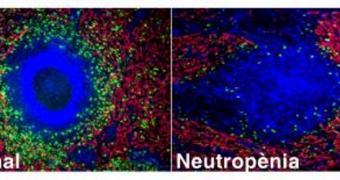Neutrophils, cells that are known for their ability to clean infections, can apparently be found in the spleen at all time. Researchers had no idea that this was the case, so the discovery puzzled them.
The team behind the work was able to determine that the neutrophils in the spleen in fact play a immunoregulating role, meaning that they contribute to regulating the activity of the immune system.
Scientists with the Biology of B Cells of IMIM (Hospital del Mar Research Institute) worked closely with American colleagues from the Mount Sinai Hospital, in New York City, for this investigation.
One of the reasons why this finding is so important has to do with the importance of the spleen. There must be a reason why neutrophils remain inside this organ, whereas they are not present in others.
These cells are the first to respond to infections. Whenever a pathogen invades the body, they move to the infection site as fast as possible, and immediately commence their attack on the foreign bodies.
As soon as the first attack is mounted, neutrophils release chemicals that call on other cells in the immune system to join the battle. This made experts think of them as not being so important overall.
But the new discovery may change that view, the research team says. “This study has revealed that neutrophils are found in the spleen without there being an infection, contributing totally new knowledge in the field of biology,” Andrea Cerutti explains.
The expert was the coordinator of the research group on the Biology of B Cells of IMIM. He also holds an appointment as a professor at ICREA. Oddly enough, the team also found that neutrophils start taking up residence in the spleen even as the fetus develops, which is extremely early on.
The team also noticed that spleen neutrophils are located in very close proximity to immune system cells called B lymphocytes. Researchers hypothesize that the former provide quick-activation services to the latter, allowing them to go out on the attack a lot faster than they would otherwise have.
“Through several different experimental approaches we have proven that neutrophils in the spleen acquire the ability to interact with B cells or B lymphocytes, inducing the production of antibodies, a role that lymphocytes circulating in blood are not able to do,” IMIM expert Irene Puga addsm quoted by EurekAlert.

 14 DAY TRIAL //
14 DAY TRIAL //